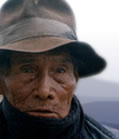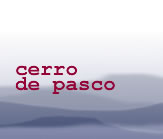 |
 |
||
 |
|||
|
RELATED THEMES agriculture education employment and income industry livestock migration OTHER LOCAL THEMES BACKGROUND |
development
With decline of farming and the uncertainties - and health and environmental costs - of the mining industry, many narrators make a powerful case for greater investment into small businesses and local industries. The young people leave, they argue, because there are no job opportunities locally. Training is needed - in weaving, dairying, tailoring, improving livestock, and in developing wool and textile industries, bakeries, fish farm and mineral water plants. One of the problems, identified by one narrator, is that neither in the country nor in the local towns, has there been any attempt to support manufacturing or processing: the region was seen solely as a producer of raw materials. "Currently, for example, the campesino doesn't think about transforming the products. Here the campesino always takes his wool...from here to Cerro de Pasco or to Carhuamayo and that wool then goes to the mills in Lima. The price they sell it for here is the 'price of an egg' (a pittance).the middlemen are the ones who benefit. The same thing happens with the minerals. Here in Cerro de Pasco, they don't even make nails. So what happens? There are no jobs because they don't develop industries here to create jobs" (Peru 15). He argues strongly for government assistance in the form of training and credit, especially for the campesino, for whom land reform was only part of the answer to development. Another narrator, from Quiulacocha, agrees with the need for training: "we have just installed about eight looms so we'll be able to use or industrialise the wool; but the problem.is that we need [technical] support.The future of my community will depend on the development of the small industries we have here." (Peru 4). One man has given the question of development much thought and challenges the idea that the answer lies simply in economic growth: ". in the university they taught us that the country and villages of the area are going to develop, that when they have industries, there will be work for all. But I don't believe that this is enough. I believe we'll develop when we recognise our Andean culture; its not just to do with economic development but also with personal development, cultural development, and I think that these days, despite the fact that many of the young people don't count on it, there are some who are producing interesting ideas to bring their villages forward" (Peru 15). quotes about development"A campesino on his own is not going to be able to do anything, he has to be organised, the communities must be strengthened to be able to move forward, to be able to secure loans if he wants to set up industries in the future, for example." "Like I told you señor, if we work hard, if there is support for the campesina communities be it in guinea pigs, chickens or pigs, a few small animals so people can work, possibly in groups, we could advance in every community. But, señor, we still don't have that kind of help, and with this type of help we also need trained people, so they can teach the relevant technologies, señor." "We do have a thermal spring in Yauli. According to what the Chemical Faculty in the capital said, these waters are mineral, like San Mateo. So we're thinking about setting up an industry. We've got other projects too. We're also doing something about farming trout - all things you need to create companies for." "If I wanted to set up a small business, there's no one to buy from me because you can count the population on your fingers. So the future's in other places, let's say in Huancayo, Lima and even in Cerro de Pasco itself.the future's elsewhere." "We need more sources of work. More so now that the population has increased. Automobile bodywork factories, mechanical workshops and other repair shops and services can be set up. We need technical schools. We have to think of new things, because, sadly, we are no longer a livestock or agricultural community. Due to the [toxic] fumes we have lost production and our lives have changed. Now we must think of other things." ". we've been entrepreneurs and have established the cooperative and the bakery and this way we're trying to improve, to overcome it all as they say. Now we don't expect much from the company or even central government. We've been waiting for a long time and they haven't done anything to solve the problems, nothing. That's why the young people go away." "Wool has never been transformed here. It's the same with dairy products, for example. Cheese and butter, let's say, have never been mass produced to be exported, although everyone knows that dairy products from this area are of high quality. So, all this hasn't contributed to the development of this part of the country. It's been the same with mining: the gringos left, they took everything and backwardness and poverty continues. All this despite the fact that there was an agrarian reform which put an end, in principle, to the Fernandinis and all the big landowners." |
|